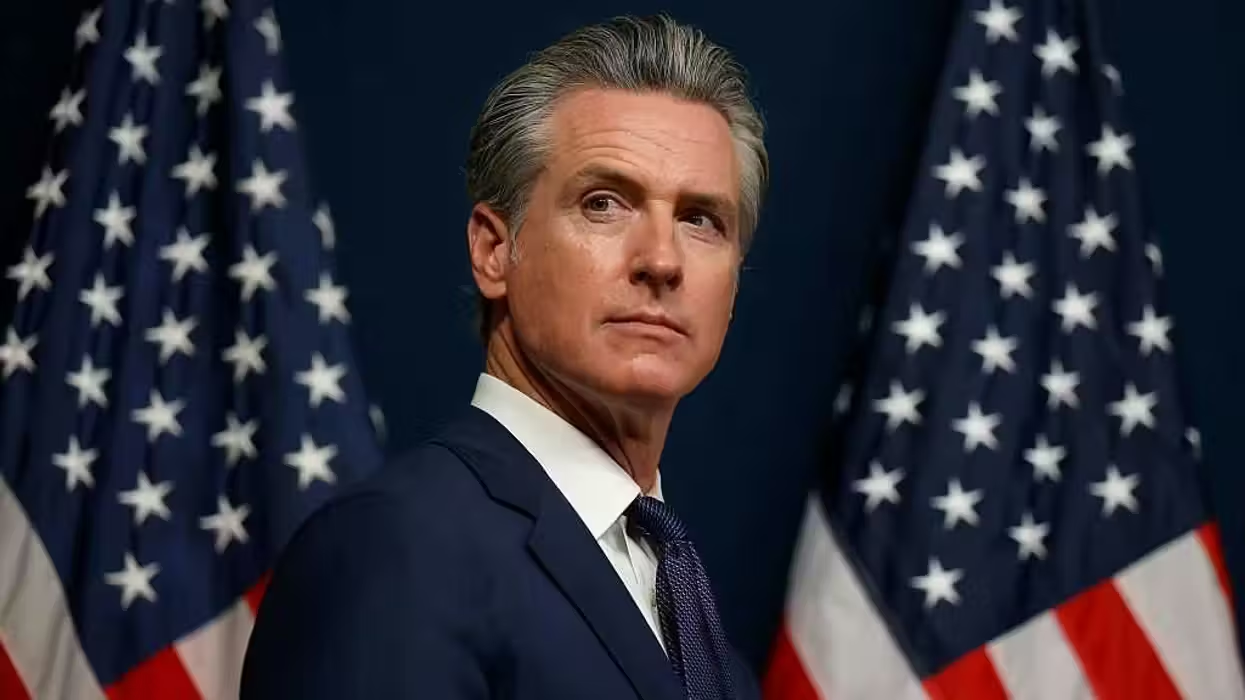
© 2025 Blaze Media LLC. All rights reserved.
The 19th century Frenchman's message on liberty endures.
 (Image Source: Wikipedia)
(Image Source: Wikipedia)
On this day in which Supreme Court decisions came down on the side of liberty in cases involving government coercion and union coercion, it is perhaps apropos that it is also the birthday of a great proponent of liberty and commentator on the law himself, French classic liberal, economic journalist and legislator Frédéric Bastiat.
This is not to suggest that Bastiat could have even accepted, let alone conceived of Obamacare or existing public sector union powers on which these rulings were made to begin with, but nevertheless such decisions are fitting on the day of his birth.
Bastiat, who was born some 213 years ago in Bayonne, France, wrote perhaps most eloquently with respect to liberty and the law, expressing positions that are as meaningful and relevant today as when they were first written.
In his, "The Law," Bastiat begins:
"The law perverted! And the police powers of the state perverted along with it! The law, I say, not only turned from its proper purpose but made to follow an entirely contrary purpose! The law become the weapon of every kind of greed! Instead of checking crime, the law itself guilty of the evils it is supposed to punish!
If this is true, it is a serious fact, and moral duty requires me to call the attention of my fellow-citizens to it."
Bastiat continues:
"We hold from God the gift which includes all others. This gift is life — physical, intellectual, and moral life.
But life cannot maintain itself alone. The Creator of life has entrusted us with the responsibility of preserving, developing, and perfecting it. In order that we may accomplish this, He has provided us with a collection of marvelous faculties. And He has put us in the midst of a variety of natural resources. By the application of our faculties to these natural resources we convert them into products, and use them. This process is necessary in order that life may run its appointed course.
[sharequote align="center"]Individuality, liberty, property...these three gifts from God precede all human legislation[/sharequote]
Life, faculties, production — in other words, individuality, liberty, property — this is man. And in spite of the cunning of artful political leaders, these three gifts from God precede all human legislation, and are superior to it. Life, liberty, and property do not exist because men have made laws. On the contrary, it was the fact that life, liberty, and property existed beforehand that caused men to make laws in the first place.
What, then, is law? It is the collective organization of the individual right to lawful defense.
Each of us has a natural right — from God — to defend his person, his liberty, and his property. These are the three basic requirements of life, and the preservation of any one of them is completely dependent upon the preservation of the other two. For what are our faculties but the extension of our individuality? And what is property but an extension of our faculties? If every person has the right to defend even by force — his person, his liberty, and his property, then it follows that a group of men have the right to organize and support a common force to protect these rights constantly. Thus the principle of collective right — its reason for existing, its lawfulness — is based on individual right. And the common force that protects this collective right cannot logically have any other purpose or any other mission than that for which it acts as a substitute. Thus, since an individual cannot lawfully use force against the person, liberty, or property of another individual, then the common force — for the same reason — cannot lawfully be used to destroy the person, liberty, or property of individuals or groups.
[instory-book ISBN="9781612930121"]
Such a perversion of force would be, in both cases, contrary to our premise. Force has been given to us to defend our own individual rights. Who will dare to say that force has been given to us to destroy the equal rights of our brothers? Since no individual acting separately can lawfully use force to destroy the rights of others, does it not logically follow that the same principle also applies to the common force that is nothing more than the organized combination of the individual forces?
If this is true, then nothing can be more evident than this: The law is the organization of the natural right of lawful defense. It is the substitution of a common force for individual forces. And this common force is to do only what the individual forces have a natural and lawful right to do: to protect persons, liberties, and properties; to maintain the right of each, and to cause justice to reign over us all.
If a nation were founded on this basis, it seems to me that order would prevail among the people, in thought as well as in deed. It seems to me that such a nation would have the most simple, easy to accept, economical, limited, nonoppressive, just, and enduring government imaginable — whatever its political form might be.
Under such an administration, everyone would understand that he possessed all the privileges as well as all the responsibilities of his existence. No one would have any argument with government, provided that his person was respected, his labor was free, and the fruits of his labor were protected against all unjust attack. When successful, we would not have to thank the state for our success. And, conversely, when unsuccessful, we would no more think of blaming the state for our misfortune than would the farmers blame the state because of hail or frost. The state would be felt only by the invaluable blessings of safety provided by this concept of government.
It can be further stated that, thanks to the non-intervention of the state in private affairs, our wants and their satisfactions would develop themselves in a logical manner. We would not see poor families seeking literary instruction before they have bread. We would not see cities populated at the expense of rural districts, nor rural districts at the expense of cities. We would not see the great displacements of capital, labor, and population that are caused by legislative decisions.
The sources of our existence are made uncertain and precarious by these state-created displacements. And, furthermore, these acts burden the government with increased responsibilities."
Bastiat goes on to lament that this is not how law evolved in Western society:
[sharequote align="center"]The law has been used to destroy its own objective[/sharequote]
"But, unfortunately, law by no means confines itself to its proper functions. And when it has exceeded its proper functions, it has not done so merely in some inconsequential and debatable matters. The law has gone further than this; it has acted in direct opposition to its own purpose. The law has been used to destroy its own objective: It has been applied to annihilating the justice that it was supposed to maintain; to limiting and destroying rights which its real purpose was to respect. The law has placed the collective force at the disposal of the unscrupulous who wish, without risk, to exploit the person, liberty, and property of others. It has converted plunder into a right, in order to protect plunder. And it has converted lawful defense into a crime, in order to punish lawful defense.
How has this perversion of the law been accomplished? And what have been the results?
The law has been perverted by the influence of two entirely different causes: stupid greed and false philanthropy.
Ultimately, the antidote to the perversion of the law that Bastiat documents throughout his short libertarian manifesto is as follows:
"God has given to men all that is necessary for them to accomplish their destinies. He has provided a social form as well as a human form. And these social organs of persons are so constituted that they will develop themselves harmoniously in the clean air of liberty. Away, then, with quacks and organizers! Away with their rings, chains, hooks, and pincers! Away with their artificial systems! Away with the whims of governmental administrators, their socialized projects, their centralization, their tariffs, their government schools, their state religions, their free credit, their bank monopolies, their regulations, their restrictions, their equalization by taxation, and their pious moralizations!
And now that the legislators and do-gooders have so futilely inflicted so many systems upon society, may they finally end where they should have begun: May they reject all systems, and try liberty; for liberty is an acknowledgment of faith in God and His works."
[sharequote align="center"]For liberty is an acknowledgment of faith in God and His works.[/sharequote]
--
Follow Ben Weingarten (@bhweingarten) and TheBlazeBooks on Twitter and Facebook.
Want to leave a tip?
We answer to you. Help keep our content free of advertisers and big tech censorship by leaving a tip today.
Want to join the conversation?
Already a subscriber?
Ben Weingarten is a writer, commentator, and editor at large at RealClearInvestigations. He is a senior contributor at the Federalist and writes columns for Newsweek and the Epoch Times.
Ben Weingarten
Ben Weingarten is a writer, commentator, and editor at large at RealClearInvestigations. He is a senior contributor at the Federalist and writes columns for Newsweek and the Epoch Times.
more stories
Sign up for the Blaze newsletter
By signing up, you agree to our Privacy Policy and Terms of Use, and agree to receive content that may sometimes include advertisements. You may opt out at any time.
Related Content
© 2025 Blaze Media LLC. All rights reserved.
Get the stories that matter most delivered directly to your inbox.
By signing up, you agree to our Privacy Policy and Terms of Use, and agree to receive content that may sometimes include advertisements. You may opt out at any time.





